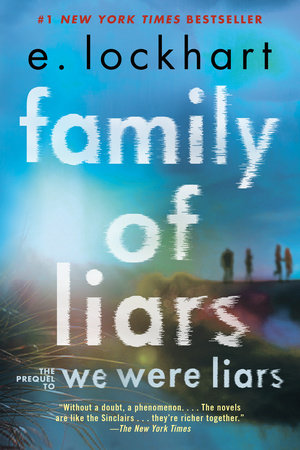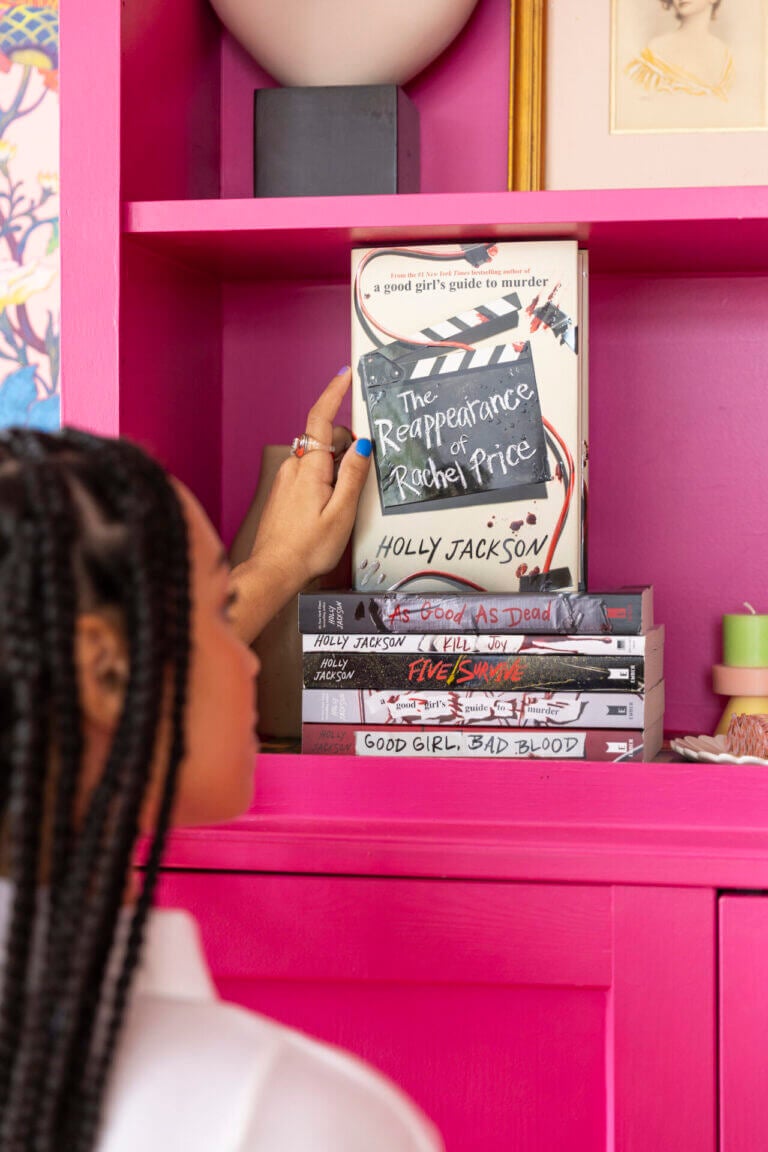The thrilling prequel to the TikTok phenomenon and #1 New York Times bestseller We Were Liars takes readers back to the story of another summer, another generation, and the secrets that will haunt them for decades to come. Start reading Family of Liars by E. Lockhart now…
1.
MY SON JOHNNY is dead.
Jonathan Sinclair Dennis, that was his name. He died at age fifteen.
There was a fire and I love him and I wronged him and I miss him. He will never grow taller, never find a partner, never train for another race, never go to Italy like he wanted, never ride the kind of roller coaster that flips you upside down. Never, never, never. Never anything.
Still, he visits my kitchen on Beechwood Island quite often.
I see him late at night when I can’t sleep and come down for a glass of whiskey. He looks just like he always did at fifteen. His blond hair sticks up, tufty. He has a sunburn across his nose. His nails are bitten down and he’s usually in board shorts and a hoodie. Sometimes he wears his blue-checked windbreaker, since the house runs cold.
I let him drink whiskey because he’s dead anyway. How’s it going to hurt him? But often he wants hot cocoa instead. The ghost of Johnny likes to sit on the counter, banging his bare feet against the lower cabinets. He takes out the old Scrabble tiles and idly makes phrases on the countertop while we talk. Never eat anything bigger than your ass. Don’t take no for an answer. Be a little kinder than you have to be. Stuff like that.
He often asks me for stories about our family. “Tell about you were teenagers,” he says tonight. “You and Aunt Penny and Aunt Bess.”
I don’t like talking about that time. “What do you want to know?”
“Whatever. Stuff you got up to. Hijinks. Here on the island.”
“It was the same as now. We took the boats out. We swam. Tennis and ice cream and suppers cooked on the grill.”
“Did you all get along back then?” He means me and my sisters, Penny and Bess.
“To a point.”
“Did you ever get in trouble?”
“No,” I say. Then, “Yes.”
“What for?”
I shake my head.
“Tell me,” he pushes. “What’s the worst thing you did? Come on, spill it.”
“No!” I laugh. “Yes! Pretty please? The absolute worst thing you ever did, back then. Tell your poor dead son all the gory details.”
“Johnny.”
“Oh, it can’t be that bad,” he says. “You have no idea the things I’ve seen on television. Way worse than anything you could have done in the 1980s.”
Johnny haunts me, I think, because he can’t rest without answers. He keeps asking about our family, the Sinclair family, because he’s trying to understand this island, the people on it, and why we act the way we do. Our history.
He wants to know why he died.
I owe him this story.
“Fine,” I say. “I’ll tell you.”
MY FULL NAME is Caroline Lennox Taft Sinclair, but people call me Carrie. I was born in 1970. This is the story of my seventeenth summer.
That was the year the boys all came to stay on Beechwood Island. And the year I first saw a ghost.
I have never told this particular story to anyone, but I think it is the one that Johnny needs to hear.
Did you ever get in trouble? he asks. Tell me. What’s the worst thing you did? Come on, spill it . . . The absolute worst thing you ever did, back then.
Telling this story will be painful. In fact, I do not know if I can tell it truthfully, though I’ll try.
I have been a liar all my life, you see.
It’s not uncommon in our family.
PART 2
FOUR SISTERS
MY CHILDHOOD IS a blur of wintry Boston mornings, my sisters and I bundled in boots and itchy wool hats. School days in uniforms with thick navy cardigans and pleated skirts. Afternoons in our tall brick town house, doing homework in front of the fireplace. If I close my eyes, I can taste sweet vanilla pound cake and feel my own sticky fingers. Life was fairy tales before bed, flannel pajamas, golden retrievers.
There were four of us girls. In the summers, we went to Beechwood Island. I remember swimming in the fierce ocean waves with Penny and Bess while our mother and baby Rosemary sat on the shore. We caught jellyfish and crabs and kept them in a blue bucket. Wind and sunlight, small quarrels, mermaid games and rock collections.
Tipper, our mother, threw wonderful parties. She did it because she was lonely. On Beechwood, anyway. We did have guests, and for some years my father’s brother Dean and his children were there with us, but my mother thrived at charity suppers and long lunches with dear friends. She loved people and was good at loving them. Without many around on the island, she made her own fun, having parties even when we hadn’t anybody visiting.
When the four of us were little, my parents would take us to Edgartown each Fourth of July. Edgartown is a seafaring village on the island of Martha’s Vineyard, all white picket fences. We’d get deep-fried clams with tartar sauce in paper containers and then buy lemonade from a stand in front of the Old Whaling Church. We’d set up lawn chairs, then eat as we waited for the parade. Local businesses had decorated floats. Vintage car collectors proudly tooted their horns. The island fire stations paraded their oldest engines. A veterans’ band played Sousa marches and my mother would always sing: “Be kind to your fine-feathered friends / For a duck could be somebody’s mother.”
We never stayed for the fireworks. Instead, we motored back to Beechwood and ran up from the family boat dock to the real party.
Clairmont house’s porch would be decked out in fairy lights and the large picnic table on the lawn dressed in blue and white. We’d eat corn on the cob, hamburgers, watermelon. There would be a cake like an American flag, with blueberries and raspberries on top. My mother would have decorated it herself. Same cake, every year.
After supper she’d give us all sparklers. We’d parade along the wooden walkways of the island—the ones that led from house to house—and sing at the top of our lungs. “America the Beautiful,” “This Land Is Your Land,” “Be Kind to Your Fine-Feathered Friends.”
In the dark, we’d head to the Big Beach. The groundskeeper, Demetrios in those days, would set off fireworks. The family sat on cotton blankets, the adults holding glasses of clinking ice.
Anyway. It’s hard to believe I was ever quite so blindly patriotic, and that my highly educated parents were. Still, the memories stick.
IT NEVER OCCURRED to me that anything was wrong with how I fit into our family until one afternoon when I was fourteen. It was August, 1984.
We had been on the island since June, living in Clairmont. The house was named for the school that Harris, our father, had attended when he was a boy. Uncle Dean and my cousins lived in Pevensie, named for the family in the Narnia books. A nanny stayed the summer in Goose Cottage. The staff building was for the housekeeper, the groundskeeper, and other occasional staff, but only the housekeeper slept there regularly. The others had homes on the mainland.
I had been swimming all morning with my sisters and my cousin Yardley. We had eaten tuna sandwiches and celery from the cooler at my mother’s feet. Sleepy from lunch and exercise, I set my head down and put one hand on Rosemary. She was napping next to me on the blanket, her eight-year-old arms covered in mosquito bites, her legs sandy. Rosemary was blond, like the rest of us, with tangled waves. Her cheeks were soft and peachcolored, her limbs skinny and unformed. Freckles; a tendency to squint; a goofy laugh. Our Rosemary. She was strawberry jam, scabby knees, and a small hand in mine.
I dozed for a bit while my parents talked. They were sitting in lawn chairs beneath a white umbrella, some distance away. I woke when Rosemary rolled onto her side, and I lay there with my eyes closed, feeling her breathe under my arm.
It’s not worth it,” my mother was saying. “It just isn’t.”
“She shouldn’t have it hard when we can fix it,” my father answered.
“Beauty is something—but it’s not everything. You act like it’s everything.”
“We’re not talking about beauty. We’re talking about helping a person who looks weak. She looks foolish.”
“Why be so harsh? There’s no need to say that.”
“I’m practical.”
“You care what people think. We shouldn’t care.”
“It’s a common surgery. The doctor is very experienced.”
There was the sound of my mother lighting a cigarette. They all smoked, back then. “You’re not thinking about the time in the hospital,” Tipper argued. “A liquid diet, the swelling, all that. The pain she’s going to suffer.”
Who were they talking about? What surgery? A liquid diet?
“She doesn’t chew normally,” said Harris. “That’s just a fact. There’s ‘no way out but through.’ ”
“Don’t quote me Robert Frost right now.”
“We have to think about the endgame. Not worry how she gets there. And it wouldn’t hurt for her to look—” He paused for a second and Tipper jumped in. “You think about pain like it’s a workout or something. Like it’s just effort. A struggle.”
“If you put in effort, you gain something from it.” An inhale on the cigarette. Its ashy smell mixed with the salt of the air.
“Not all pain is worth it,” said Tipper. “Some pain is just pain.” There was a pause. “Should we put sun lotion on Rosemary? She’s getting pink.”
“Don’t wake her.” Another pause. Then: “Carrie is beautiful as she is,” said Tipper. “And they have to cut through the bone, Harris. Cut through the bone.”
I froze.
They were talking about me.
Before coming to the island, I had been to the orthodontist and then to an oral surgeon. I hadn’t minded. I had barely paid attention. Half the kids at school had braces.
“She shouldn’t have a strike against her,” said Harris. “Her face this way, it’s a strike against her. She deserves to look like a Sinclair: strong on the outside because she’s strong on the inside. And if we have to do that for her, we have to do that for her.”
I realized they were going to break my jaw.
3.
WHEN WE FINALLY discussed it, I told my parents no. I said I could chew just fine (though the oral surgeon disagreed). I said I was happy with myself. They should leave me alone.
Harris pushed back. Hard. He talked to me about the authority of surgeons and why they knew best.
Tipper told me I was lovely, beautiful, exquisite. She told me she adored me. She was a kind person, narrow-minded and creative, generous and fun-loving. She always told her daughters they were beautiful. But she still thought I should consider the surgery. Why didn’t we let the question sit? Decide later? There was no rush.
I said no again, but inside, I had begun to feel wrong. My face was wrong. My jaw was weak. I looked foolish. Based on a fluke of biological destiny, other people would make assumptions about my character. I noticed them making those assumptions, now, pretty regularly. There was that slight condescension in their voices. Did I get the joke?
I began to chew slowly, making sure my mouth was shut tight. I felt uncertain of my own teeth, whether they ground up food like other people’s did. The way they fit together began to feel strange.
I already knew boys didn’t think I was pretty. Even though I was popular—went to parties and was even elected freshman delegate to the student council—I was always one of the last to be invited to dances. Boys asked girls in those days.
At the dances, my dates never held my hand. They didn’t kiss me, or press against me in the dark of the dance floor. They didn’t wonder if they could see me again and go to the movies, the way they did with my friends.
I watched my sister Penny, whose square jawline was nothing to her, shove food into her mouth while talking. She would laugh with her jaw wide open, stick her tongue out and let people see every shining white molar.
I watched Bess, whose mouth was fuller and sweeter, and whose jaw was a forceful, feminine curve, complain about her six months of braces and the retainer that followed. She snapped the blue plastic retainer cover open with a groan when Tipper reminded her to replace it after meals.
And Rosemary. Her square face mirrored Penny’s, only freckled and goofy.
All my sisters, their bones were beautiful.
4.
THE SUMMER I was sixteen, we spent our days on Beechwood, as always. Kayaks, corn on the cob, sailboats, and snorkeling (though we didn’t see much besides the occasional crab). We had the usual Fourth of July celebration with sparklers and songs. Our annual Bonfire Night, our Lemon Hunt, our Midsummer Ice Cream party.
Only that year—Rosemary drowned.
She was ten years old. The youngest of us four.
It happened at the end of August. Rosemary was swimming at the beach by Goose Cottage. We call it the Tiny Beach. She wore a green bathing suit with little denim pockets on it. Ridiculous pockets. You couldn’t put anything in them. It was her favorite.
I wasn’t there. No one in the family was. She was with the au pair we had that year, a twenty-year-old woman from Poland. Agata.
Rosemary always wanted to swim later than anyone else. Long after we all went to rinse our feet at the hose by the Clairmont mudroom door, Rosemary would swim, if she was allowed. It wasn’t uncommon for her to be with Agata on one beach or the other.
But that day, the sky turned cloudy.
That day, Agata went inside to get sweaters for them both.
That day, Rosemary, a good swimmer always, must have been knocked down by a wave and caught in the undertow.
When Agata came back outside, Rosemary was far out, and struggling. She was beyond the wicked black rocks that line the cove.
Agata wasn’t a lifeguard.
She didn’t know CPR.
She wasn’t even a fast enough swimmer to reach Rosemary in time.





